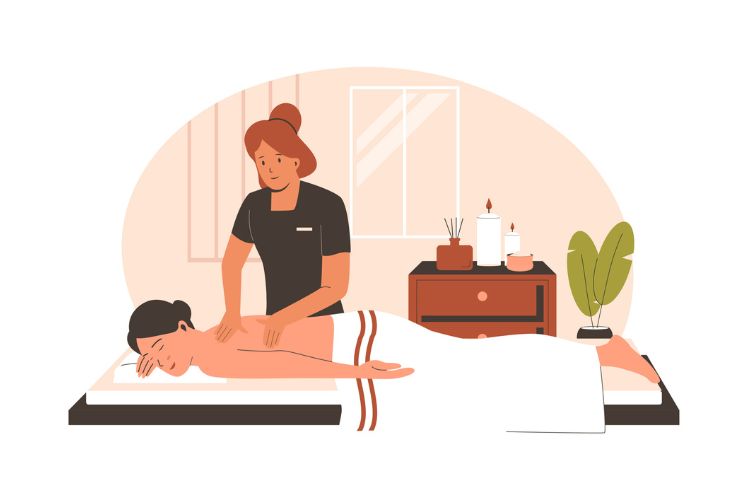Many of us are searching for ways to better manage stress, anxiety, and other mental health challenges in our lives. Massage therapy offers more than just physical relaxation—it can actually boost our mood, reduce anxiety, and improve our sense of well-being. Studies have shown that different massage techniques can lower stress hormones, ease muscle tension, and even help with sleep, all of which make a real difference for mental health.
There are several types of massage available, each bringing unique benefits. From Swedish and deep tissue to shiatsu and aromatherapy, these treatments can support both our bodies and our minds. Understanding how various massages work helps us choose the most effective option for our mental health needs. For example, some styles may help us feel calmer and more confident, while others focus on relieving physical pain and emotional tension.
If we want to use massage as part of our mental health care, it is important to know what each style offers and how it can help us feel better. To learn more about how massage can help with mental health, including the science behind it and what options might work best for us, we can read about the benefits discussed by trusted sources like Mayo Clinic Health System and Medical News Today.
Key Takeaways
- Massage therapy can improve our mental health and sense of well-being.
- Different massage styles offer unique benefits for relaxation and emotional support.
- Choosing the right massage helps us manage stress, anxiety, and other mental health challenges.
The Connection Between Massage and Mental Health
Massage affects our mental well-being by lowering tension, helping balance important brain chemicals, and promoting emotional stability. It can support those dealing with mental health struggles and boost overall quality of life.
How Massage Influences Stress and Anxiety
Massage therapy is known to ease stress and soothe anxiety. The pressure and motion from massage calm our body’s “fight or flight” response. This helps to lower levels of stress hormones such as cortisol in our bloodstream.
When stress hormones drop, we often notice a sense of relaxation. This feeling can last for hours after a session. Many people report that massage helps improve their confidence and reduce muscle tension tied to anxious feelings.
We may also see better sleep and more energy. Clinical evidence has linked massage to reduced stress and anxiety, which can lead to a better emotional state and more engagement with daily life.
The Science Behind Massage and Mood
Certain hormones and brain chemicals play a direct role in how we feel. Massage therapy has been shown to boost levels of serotonin and dopamine, which are linked to happiness and pleasure.
This rise in feel-good chemicals can explain why we may notice a lift in our mood soon after a massage. The body also releases endorphins, which are natural painkillers and mood enhancers.
A relaxing massage session can calm the nervous system, reducing chronic stress and promoting a balanced mental state. Research highlights these physiological changes as key reasons why massage can support emotional stability.
Impact on Depression and Emotional Wellness
Depression often makes daily challenges feel overwhelming. Massage offers both immediate relief and long-term benefits by helping regulate our body’s chemical balance.
Regular sessions can help lower feelings of sadness by encouraging relaxation and social contact. Improved serotonin and dopamine balance can lessen depressive symptoms. People who receive massage may also notice better sleep and improved quality of life.
By reducing physical symptoms such as tension and fatigue, massage can help us feel more hopeful and present. These effects make massage a valuable tool to support emotional wellness and daily functioning.
Popular Types of Massage Therapies
Massage therapy uses different techniques to support relaxation, relieve muscle tension, and help manage stress or anxiety. Each type of massage has specific methods and benefits that focus on physical comfort, emotional well-being, or both.
Swedish Massage and Its Benefits
Swedish massage is one of the most common types of manual therapy. This technique uses long, flowing strokes, gentle kneading, and circular movements on the top layers of muscle. It is often chosen for its relaxing and calming effects.
We find Swedish massage promotes relaxation and increases blood flow. It can help reduce muscle tension caused by daily stress. This type of massage also improves circulation, which may boost our mood and energy levels.
A session can also include light stretching or reflexology for added comfort. Swedish massage is suitable for beginners and those who want a gentle, soothing experience. It is an effective option for people looking to unwind and manage mild anxiety or stress. You can read more on different types such as Swedish massage here.
Deep Tissue Massage for Emotional Balance
Deep tissue massage targets the deeper layers of muscle and connective tissue. The pressure used is firmer and reaches muscles that are tight from stress or injury. It is especially helpful for treating chronic pain or stiffness.
With this method, we may experience some discomfort as the therapist works on knots or ‘trigger points’. However, this approach can have mental health benefits. Deep tissue massage is linked to lower tension, which often leads to better sleep and improved emotional balance.
By easing muscle tightness, we may also notice better body awareness. Some people report feeling lighter or more positive after a session. This massage type can be part of our stress management tools when practiced alongside mindfulness.
Aromatherapy Massage and Essential Oils
Aromatherapy massage combines gentle massage with essential oils. These oils are chosen for their natural aromas and possible therapeutic properties. Popular oils include lavender for relaxation, peppermint for alertness, and eucalyptus for clearing the mind.
During the treatment, essential oils are either applied to the skin or diffused in the air. This approach enhances relaxation and supports mood improvement. The mixed effect on mind and body makes it a preferred choice for emotional support and stress relief.
We benefit from both the calming touch and the effects of chosen oils. Aromatherapy massage can also encourage better sleep and a more peaceful state of mind, making it useful for those struggling with anxiety. For more insight on the mental health effects of massage, see here.
Thai Massage: Techniques and Effects
Thai massage is a traditional manual therapy that is quite different from other popular forms. It combines stretching, deep pressure, and rhythmic compression along the body’s energy lines. No oils are used, and we usually remain fully clothed during the session.
This method boosts flexibility, eases muscle tension, and enhances mobility. It also requires us to be active participants, moving through various stretches guided by the therapist. Thai massage is known for increasing energy and helping with physical and mental fatigue.
We may also become more aware of our own body’s limits and stresses. The focus on stretches paired with mindful breathing makes Thai massage unique. These techniques can help us feel more relaxed, focused, and balanced, both physically and mentally. Learn more about specific massage techniques here.
Mental Health Benefits of Massage
Massage therapy offers several important mental health benefits. These include helping to relieve stress, reduce anxiety, improve sleep quality, and ease symptoms of depression. Different types of massage aim to promote relaxation and help us feel better both physically and mentally.
Reducing Anxiety and Stress
Massage is well-known for lowering stress and anxiety. When we experience stress, our body's muscles often feel tense, and our mind is less able to relax. Massage can help reduce these physical and mental responses by releasing endorphins and other mood-boosting chemicals.
Studies show that massage supports the body's natural ability to manage stress. Regular sessions can decrease feelings of worry and help us feel more in control. The act of touch can also help us feel supported and cared for, which lowers anxiety even further.
In addition to helping with stress management, massage can improve mood and boost our sense of well-being. It often leads to increased confidence and a better self-image, as shown in recent research on massage for anxiety and stress.
Alleviating Symptoms of Depression
Massage is used as a tool to reduce the symptoms of depression. It works by relaxing the body, easing muscle tension, and increasing feelings of comfort. This physical relaxation helps us shift our focus away from negative thoughts.
Simple touch and mindful breathing during a massage can lead to emotional relief. Research has found that massage may increase serotonin and dopamine, which are chemicals in the brain that lift our mood and promote happiness. This helps people cope better with sadness or low energy.
These effects may support us if we are living with chronic diseases or ongoing fatigue, as mental health challenges often come with physical discomfort. Evidence suggests that massage therapy can play a role in managing psychiatric symptoms, especially when combined with other treatments.
Improving Sleep Quality and Fighting Insomnia
Massage therapy can help improve our sleep quality and tackle problems like insomnia. Many of us struggle to fall asleep or stay asleep due to stress, anxiety, or pain. Massage assists by relaxing both our mind and muscles, making it easier to rest at night.
The relaxation response triggered by massage lowers stress hormones in the body. This helps us drift off faster and enjoy deeper sleep. When sleep improves, other mental health issues such as fatigue and irritability also decrease.
Therapists often use different massage techniques to support better sleep, which can be especially helpful for people with chronic sleep difficulties. Consistent massage treatments have been linked to better sleep and more energy during the day, as described in studies about massage improving sleep and fighting insomnia.
Physical Effects and Their Role in Emotional Well-being
When we experience physical discomfort, our mental health can also suffer. Regular massage addresses key physical issues that can improve our mood, lessen stress, and support overall well-being.
Muscle Tension and Pain Relief
Muscle tension is common when we are stressed or anxious. Massage therapy helps our muscles relax through gentle pressure and movement. This can reduce pain, especially for people dealing with chronic pain or muscle pain from sitting or working long hours.
Less muscle tension often leads to fewer headaches and less pain throughout the day. We may notice that not only does our body feel better, but our mind is clearer too. Relaxed muscles can help us sleep better, which also supports mental health.
Research shows that massage can lower stress and anxiety levels. This effect is linked to pain relief, increased relaxation, and the release of feel-good hormones.
Enhancing Flexibility and Range of Motion
Massage can gently stretch muscles and tissues. This improves flexibility and makes joints move more easily. Better flexibility means we can move through everyday tasks with less discomfort or stiffness.
As our range of motion increases, our risk of injuries from daily activities or exercise may decrease. Improved mobility supports an active lifestyle, which is linked to better mental well-being. We are more likely to stay social and engaged if we move freely.
By helping our bodies stay flexible, massage also boosts confidence. We feel more in control, which can ease feelings of frustration or helplessness linked to limited movement.
Improved Circulation and Blood Pressure
Massage helps increase blood flow through targeted pressure and strokes. Better circulation means more oxygen and nutrients reach our muscles and tissues, which can help healing and reduce fatigue.
Regular massage is linked to lower blood pressure and improved heart health. This is important because high blood pressure and poor circulation can increase the risk of heart disease and affect mental health by adding stress.
Good circulation can also ease swelling and help our bodies get rid of waste products. This makes us feel more energetic and less sluggish, supporting a positive emotion and better daily functioning.
Special Populations and Massage Therapy
Massage therapy offers important benefits for groups with special health needs. Different approaches and safety steps are needed to improve quality of life while avoiding harm.
Massage for Pregnant Women
Pregnant women may face stress, body aches, and sleep problems. Massage tailored for pregnancy can reduce muscle tension, help with back and leg pain, and promote better rest. It may also lower anxiety and improve mood for both the mother and baby.
We must use techniques designed for pregnancy, such as side-lying positions and softer strokes. There are key times, like the first trimester, where more care should be taken or massage may need to be limited. Therapists should avoid deep pressure on the abdomen and certain pressure points as these can trigger contractions.
Choosing a therapist with extra training in prenatal massage is important for safety. Massage can help pregnant women feel more comfortable and support their mental well-being.
Considerations for Cancer Patients
Cancer patients often deal with pain, fatigue, and stress. Massage can bring comfort, ease anxiety, reduce pain, and improve sleep. However, we must adapt our approach to address weak immune systems, surgical sites, and any medical devices.
Light touch and shorter sessions are often best to avoid bruising or discomfort. We must communicate with a patient's health care team before starting any massage. Avoiding areas affected by radiation, inflammation, or tumour growth is critical for safety.
Trained therapists can use gentle methods focusing on relaxation. There is evidence that massage can support quality of life for cancer patients, but extra caution must always be used.
Managing Fibromyalgia and Chronic Conditions
People with fibromyalgia or other chronic diseases face ongoing pain, fatigue, and mood problems. Massage can help decrease pain, loosen stiff muscles, and improve sleep. It can also lower stress, helping people feel more in control of their symptoms.
We should use gentle pressure and avoid intense techniques that might cause a pain flare-up. Sessions may need to be shorter and adapted to each person's level of comfort. Some clients benefit from regular short massages rather than long sessions.
Massage often helps improve daily functioning and overall well-being in those living with long-term health issues. Always, the approach should be highly individualised and mindful of each person's needs.
Frequently Asked Questions
Massage can lower stress hormones, relax our muscles, and support better sleep. Different massage techniques offer specific advantages for mood, emotional balance, and symptoms of anxiety and depression.
What are the psychological benefits of receiving massages regularly?
Regular massages often help reduce anxiety and feelings of tension in our minds. They support deeper sleep and leave us feeling more relaxed. Many people report feeling calmer and less stressed after a series of sessions.
How can various massage techniques improve emotional wellbeing?
Techniques such as Shiatsu and Swedish massage work by calming our nervous system and reducing muscle tension. This helps us feel more balanced emotionally and can make it easier to handle daily stress. Our mood may improve over time, and we can notice a more positive outlook.
Which massage therapy is most effective for managing stress and anxiety?
Shiatsu and Swedish massage are popular options for managing stress and anxiety. Research suggests that Shiatsu massage, for example, helps people feel relaxed, eases pain, and releases tension. Swedish massage uses long, smooth strokes that can reduce worry and promote relaxation, making it a good choice for stress relief. More details can be found in this guide to different massage types.
What are the primary mental health advantages of deep tissue massage?
Deep tissue massage targets tight muscles and knots found deeper under the skin. This reduces physical discomfort, which often lowers stress levels and helps us feel more comfortable. Some people find that it decreases anxiety and improves their general sense of wellbeing as well.
Can massage therapy play a role in treating depression symptoms?
Studies show that massage may help with depression by lowering stress hormones, easing muscle tension, and promoting better sleep and relaxation. It can also help us feel more connected to our bodies and less isolated. While massage is not a cure, it can be a useful part of a broader support plan.
What is the impact of Swedish massage on an individual's mental state?
Swedish massage is known for its gentle, flowing movements, which can leave us feeling more relaxed and less anxious. This technique helps lower stress levels and can create a sense of comfort and calm. Many people experience a clearer, more focused mind after a session.





















